牛津译林版八年级下册Unit5 welcome to the unit教学课件
牛津译林版8B Unit5 Good manners Welcome to the unit课件(共28张PPT)
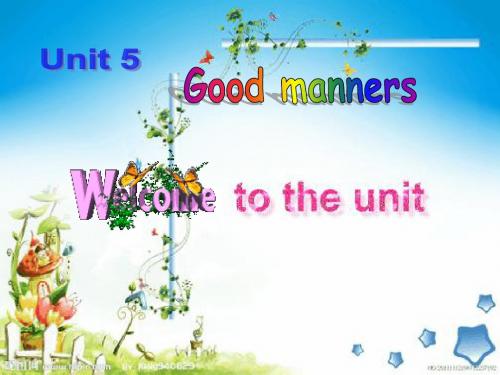
When we have lessons in the classroom,
we should work in pairs if necessary. we should listen to the teachers carefully. we should take part in class-activities. we should help group members if possible. we shouldn’t answer questions without putting up our hands. …
If we walk on the road,
we should obey traffic rules. we should look at the traffic lights. we should help the old cross the road. we shouldn’t play on the road. we shouldn’t walk side by side(并排走). …
1
2 Don’t pick flowers pick flowers in the park in the park. 4
obey traffic rules 3
keep quiet in the library throw drop rubbish litter everywhere in the bin
You offer your chair to someone older than you.
If we play games on the playground, we should queue … for our turn. shouldn’t … partners(尊重伙伴). we should respect we should have team spirit(团队精神). we shouldn’t shout loudly. we shouldn’t jump the queue. we shouldn’t fight with others. …
牛津译林版英语八年级下册Unit 5 Welcome to the unit 课件

cut in on others
queue for your turn
obey the traffic rules leave the tap
running
a drop litter everywhere b leave the tap running
c keep quiet in the library d pick flowers in the park
1. 随处扔垃圾
drop litter everywhere
2. 打断他人
cut in on others
3. 在图书馆保持安静 keep quiet in the library
4. 在公园摘花
pick flowers in the park
5. 遵守交通规则 obey traffic rules
Hobo is surprised, and he shouts, “Hey!
That’s my _ca_k_e__ !” But Eddie asks Hobo to always _w_a_it__ politely instead of c_u_tt_in_g_ in on others.
Hobo is very a_n_g_r_y_ . He thinks Eddie
C.Anything else? D.I'm afraid not.
4.You always leave the tap ___C_____. It's a
bad habit.
A.run
B.to run
C.running
D.runs
5.Can you help me ____C____ the pen? It's
译林牛津版八年级英语下册Unit5知识点总结提纲(含默写纸)
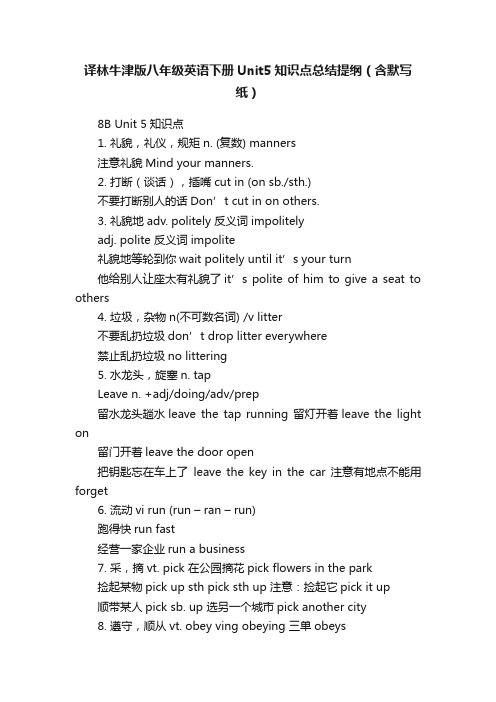
译林牛津版八年级英语下册Unit5知识点总结提纲(含默写纸)8B Unit 5知识点1. 礼貌,礼仪,规矩n. (复数) manners注意礼貌Mind your manners.2. 打断(谈话),插嘴cut in (on sb./sth.)不要打断别人的话Don’t cut in on others.3. 礼貌地adv. politely 反义词impolitelyadj. polite 反义词impolite礼貌地等轮到你wait politely until it’s your turn他给别人让座太有礼貌了it’s polite of him to give a seat to others4. 垃圾,杂物n(不可数名词) /v litter不要乱扔垃圾don’t drop litter everywhere禁止乱扔垃圾no littering5. 水龙头,旋塞n. tapLeave n. +adj/doing/adv/prep留水龙头趟水leave the tap running 留灯开着leave the light on留门开着leave the door open把钥匙忘在车上了leave the key in the car 注意有地点不能用forget6. 流动vi run (run – ran – run)跑得快run fast经营一家企业run a business7. 采,摘vt. pick 在公园摘花pick flowers in the park捡起某物pick up sth pick sth up 注意:捡起它pick it up顺带某人pick sb. up 选另一个城市pick another city8. 遵守,顺从vt. obey ving obeying 三单obeysobey- obeyed- obeyed 反义词disobey 顺从某人做某事obey sb. to do sth遵守交通规则obey traffic rules他顺从老师按时交作业He obeys the teacher to hand in homework on time9.(人、车等)排队等候queue n./vqueuing queued他正排队等车he is queuing for the bus 插队jump the queue10.(轮流的)顺序n. turn v. 变得;转向轮到你擦黑板了It’s your turn to clean the blackboard 轮流做某事take turns to do sth天变热了it’s turning hot 向某人求助turn to sb.打开(电器)turn on 关闭turn off 调高(声音)turn up 调低turn down11. 符合习俗的,正确的adj. proper adv. properly 反义词improperly正确和别人打招呼的方式the proper way to greet others the proper way of greeting others我们应当饮食适当we should eat and drink properly12. 问候,打招呼vt. greet Ving greeting相互问候greet each other英国人经常用亲吻和亲戚打招呼british people often greet relatives with a kiss13. 与某人握手shake sb’s hand Shake v/n = shaking shake- shook – shaken感到轻微的震动feel the slight shake/ shaking 摇摇头shake one’s head 晃动身体shake one’s body 14. 亲吻n./ v. kiss 复数kisses用亲吻互相问候greet each other with a kiss greet each other by kissing15. 亲密的;严密的adj. close- closer- closest v. 关闭close adj. 关着的closedadv. 靠近地close adv. 密切地closely商店星期天关门the shop is closed on Sundays.他是我最亲密的朋友he is my closest friend我住在学校附近I live near (to) my school. I live close to my school.密切地观察珍稀鸟类watch the rare birds closely16.(非正式)交谈,谈话n. conversation (可数)用有关天气的话题开始谈话start a conversation with the subjects about weather17. 避免vt. avoid避免某事avoid sth 避免做某事avoid doing sth请避免年龄体重之类的话题please avoid subjects like age or weight.避免在公共场合吸烟avoid smoking in public18. 话题,主题n. subject (可数)学科,科目你想选修哪门学科which subject would you choose to study?谈论音乐,书,或其他什么话题talk about subjects like music, books or something else.19. 表现vt/vi behave n. behavior (不可数)放规矩点behave yourself 表现礼貌behave politely 多么好的表现what good behavior 20. 民主,群众n / adj 公开的,公共的public公开地,在别人面前in public公众场所请勿大声喧哗don’t talk loudly in public/ in public places21. 推,挤push 插队,加塞push in/ cut in拉,拽pull 向岩石上攀爬pull oneself up插队到别人前面是粗鲁的It’s rude to push in before others他们不会碰到你,或从你旁边推挤过去they will not touch you or push past you.22. 撞,碰vi bump n. 保险杠bumper如果他们撞到某人,他们会说抱歉if they bump into someone, they will say sorry.撞进,撞上crash into (冲击力更强)23. 挡住某人的路in one’s way用这种方法in this way 用不同方法in different ways用另一种方法in a different ways in another way打扰一下,你挡住我的路了excuse me, you are in my way去某地的路上on the/one’s way to 在某种程度上in some ways 无论如何anyway 顺便说下by the way在许多方面in many ways 绝不in no way24. 触摸vt./n touch 复数touches温柔的抚摸gentle touches温柔地抚摸我的狗touch my dog gently触动,感动vt adj. 令人感动的,感人的touching 感动的touched 我被这部感人的电影感动到了。
2023年牛津译林版八年级英语下册《Unit 5 Good manners》(Period 3)教案
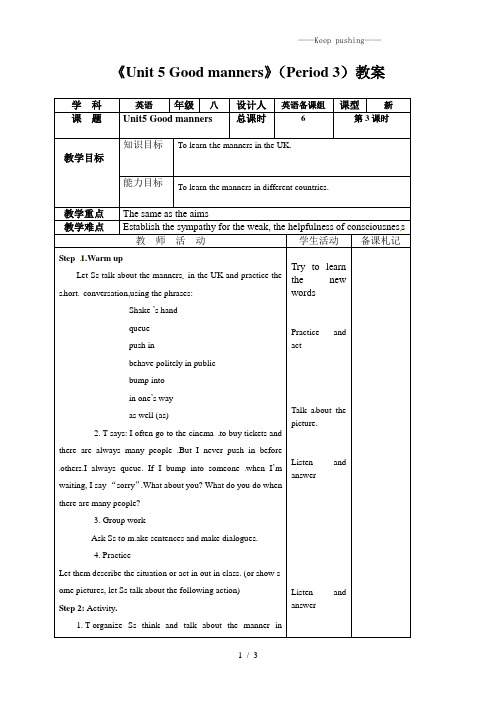
《Unit 5 Good manners》(Period 3)教案学科英语年级八设计人英语备课组课型新课题Unit5 Good manners 总课时 6 第3课时教学目标知识目标To learn the manners in the UK.能力目标To learn the manners in different countries.教学重点The same as the aims教学难点Establish the sympathy for the weak, the helpfulness of consciousnes s 教师活动学生活动备课札记Step 1.Warm upLet Ss talk about the manners in the UK and practice the s hort conversation,using the phrases:Shake ’s handqueuepush inbehave politely in publicbump intoin one’s wayas well (as)2. T says: I often go to the cinema to buy tickets and there are always many people .But I never push in before others.I always queue. If I bump into someone when I’m waiting, I say “sorry”.What about you? What do you do when there are many people?3. Group workAsk Ss to m ake sentences and make dialogues.4. PracticeLet them describe the situation or act in out in class. (or show s ome pictures, let Ss talk about the following action)Step 2: Activity.1. T organize Ss think and talk about the manner in Try to learn the new wordsPractice and actTalk a bout the picture.Listen and answerListen and answerChina .Then Finish the questions in P69Pc. T says:2. let Ss work in groups. Make a card about the manner in China according to Partc .3. Ask several groups to show us their cards.Step 3: DiscussionWork in pairs an d discuss what we should and shouldn’t do in a public place.Step 4. Language pointsStep 5.Homework Practice and act.课堂板书教学反思教师的职务是‘千教万教,教人求真’;学生的职务是‘千学万学,学做真人’。
八年级英语下Unit5第一课时课件教案(牛津译林版)

八年级英语下Unit5第一课时课件教案(牛津译林版)Unit 5 Good manners Comic strip & Welcome to the unit欏垰I. Teaching aims and learning objectives By the end of the lesson, students should be able to: 1. know different kinds of knowledge about manners; 2. talk about how to act politely in public; II. Teaching contents 1. New words and phrases: manners, eh, politely, litter, tap, run, pick, obey, queue, turn, cut in (on sb./sth.), drop litter everywhere, leave the tap running, obey traffic rules, queue for your turn 2. New structures: We should/shouldn鈥檛鈥?We can/can鈥檛鈥?Don鈥檛/Always 鈥?You are old enough to learn about manners. You鈥檙e never too old to learn. III. Focus of the lesson and predicted area of difficulty To talk about how to act politely in public in English. IV. Teaching procedures Welcome to the unit Step 1 Lead-in Watch a video T: Watch a video about good manners.В涓€浜涘叧浜庤嫳鏂囩殑绀艰矊鐢ㄨ?Step 2 Presentation 1. Show some pictures about good manners and bad manners , to learn some new words and phrases. 銆愯?2. Look and learn T: I think you all know what to do in your daily life. It鈥檚time for me to check that. First, look at the pictures. Can we ...? I鈥檓afraid not. What should we do? We should always鈥?We shouldn鈥檛鈥?T: Look at the girl. Can she 鈥? Of course not. What should she do? She should 鈥?T: What鈥檚this? It鈥檚a tap. Is it good manners to鈥?after use? I鈥檓afraid not. What 鈥?then? Always 鈥?after use. Anything else? Try to 鈥?T: Look! What are they doing? They are following the traffic rules. Herefollow means obey. Can they 鈥? 鈥?What should they do then? 鈥?T: What about this picture? What are they doing? They are waiting for their turn. Here wait for means queue. What about this one? They are jumping the queue. Do we have to 鈥?in our school dining hall? Yes, it鈥檚polite to 鈥?鈥?impolite 鈥??Step 3 Practice . Look and match T: Please match the pictures with the phrases.傘€?Step 4 Listening & Speaking 1. Listen and complete T: Amy and her cousin Shirley are discussing what they should and should not do in the library. Listen to their dialogue and complete the form.?2. Discussion T: Work in pairs. Discuss what we should and should not do in a public place. Make a new dialogue. Here are some useful expressions for you.鑳藉姏銆傘€?Step 5 Teamwork T: Write down more right things and wrong things in the video as possible as you can?Comic strip Step 6Presentation 1. Watch a video T: Now let鈥檚watch a video. 2. Think and answer T: There are three questions for you. Please think and answer. (1) What does Eddie teach Hobo? (2) What does Eddie really want from Hobo? T: Can you understand the two sentences? 3. Read and act T: Now read the dialogue in pairs and act it out.ddie鍜孒obomanners in different countries.。
牛津译林版8B Unit5 Good manners Welcome to the unit课件(共27张PPT)

What should they do in the lirary? They should keep quiet, keep the library clean and put the books back after reading . What shouldn't they do in the lirary? They shouldn't eat in the library. They shouldn't drop litter everywhere. They shouldn't eat there . They shouldn't write in the books.
Unit 5
Good manners
Welcome to the unit
complain (抱怨) Don't pick the flowery something about bad manners in public.
在公共场所
Please queue for your turn.
Make dialogues with your partne. You can choose the following places.
1. In the park , 2. At school (in class), 3. At school (after class), 4. In the resturant
Make a dialogue
In the cinema
chat in the cinema? A:Can we ______________( 聊天)? B:I'm afraid not .We should keep __________. quiet. A: Can we eat food in it ? drop litter everywhere. B: Yes, you can .But don't ______________ Please ___________. keep the cinema clean . A: OK. Anything else? B: Don't forget to ___________. take your litter away A: I see. Thank you .
牛津译林版8A Unit5 Wild animals Welcome to the unit课件(共34张PPT)
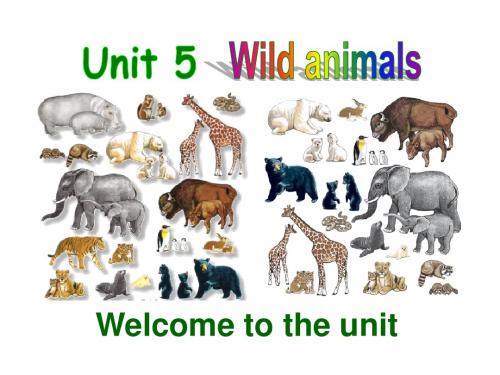
3. What wild animal does Peter like best? Why? Pandas. Because they look so cute.
4. What wild animal does Millie like best?
Pandas.
Listen and fill in the table
Welcome to the unit
Objectives To learn to say some wild
animals in English. To learn to talk about your favourite wild animals.
Words and expressions review
1. What wild animal does Kitty like best? Why? Monkeys. Because they’re so clever and funny.
2. What wild animal does Simon like best? Why? Lions. Because they’re strong and they can run very fast.
Favourite wild animals
Millie and her classmates are talking about their favourite wild animals. Listen to their conversation and answer the questions.
Some other animals
kangaroo
monkey
snake
rabbit
bird
elephant
牛津译林版8B Unit5 Good manners Comic strips & Welcome to the unit课件(共26张PPT)

Comic strips & Welcome to the unit
They are greeting their teachers.
They are standing in a line.
She is picking up the litter.
They are reading books quietly.
Task 6:Homework
1.Recite the dialogues.
2.Search more information about good manners in different countries.
Task 5:Homework.
1.Write a passage of at least 60 words on the topic “To be a student with good manners”. 2. Send your homework to me.My e-mail address is wyl678@
eat write in the books
Make a dialogue
1.Each group can choose one place.
A B C D E
2.Make a dialogue after the model. A:Can we ...in/on/at the...? B:I’m afraid not.We should.... A:Anything else? B:....
Comic strip
Comic strips
Task 1:Answer the question.
Who should learn about manners?
Unit5 词组讲义 2021-2022学年牛津译林版八年级英语下册

8B Unit5 Good manners词组讲义AWelcome to the unit1. 你已经到了学习礼仪的年龄了。
You are old enough to learn about manners.2. 你什么意思?What do you mean? = What’s your meaning?3. 别打断别人说话。
别插嘴。
Don’t cut in on others.打断(某人/某事),插嘴cut in(on sb/sth.)4. 活到老,学到老。
You are never too old to learn.5. 在公共场所应该做的正确的事the right things to do in public places6. 到处扔垃圾是不文明行为。
It’s bad manners to drop litter everywhere.7. 让水龙头开着/ 把它丢在家里了leave the tap running / leave it at home让灯开着/关着让窗开着/关着leave the light on/off leave the window open/closed8. 有礼貌地等待并保持安静wait politely and keep quiet9. 在花园摘花/另选一个城市参观/捡起它pick flowers in the park /pick another city to visit/ pick it up10. 遵守交规obey traffic rules = follow traffic rules11. 排队等候/排队做某事queue for y our turn / queue to do sth.12. 轮到某人做某事It’s one’s turn to do sth.轮到你交作业了。
It’s your turn to hand in your homework.13. 看完书后把它们放回去put the books back after readingReading14. 跟人打招呼的正确方式是什么?What’ s the proper way to greet people? (greet= say hello to)那是我能想到的帮助她的唯一方法。
牛津译林版英语八年级下册《Unit8AgreenworldWelcometotheunit》说课稿8
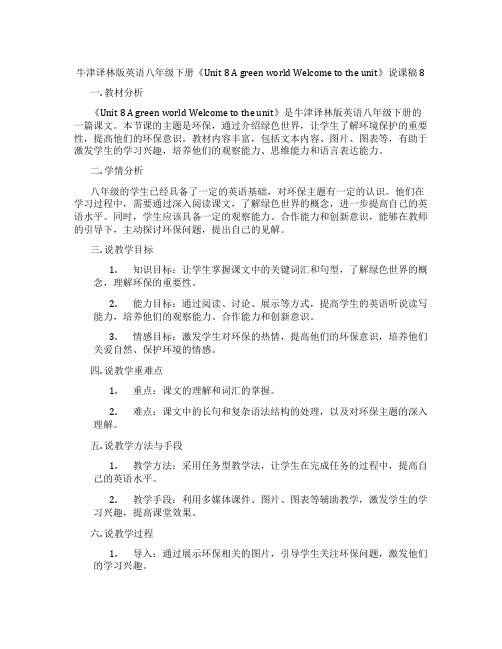
牛津译林版英语八年级下册《Unit 8 A green world Welcome to the unit》说课稿8一. 教材分析《Unit 8 A green world Welcome to the unit》是牛津译林版英语八年级下册的一篇课文。
本节课的主题是环保,通过介绍绿色世界,让学生了解环境保护的重要性,提高他们的环保意识。
教材内容丰富,包括文本内容、图片、图表等,有助于激发学生的学习兴趣,培养他们的观察能力、思维能力和语言表达能力。
二. 学情分析八年级的学生已经具备了一定的英语基础,对环保主题有一定的认识。
他们在学习过程中,需要通过深入阅读课文,了解绿色世界的概念,进一步提高自己的英语水平。
同时,学生应该具备一定的观察能力、合作能力和创新意识,能够在教师的引导下,主动探讨环保问题,提出自己的见解。
三. 说教学目标1.知识目标:让学生掌握课文中的关键词汇和句型,了解绿色世界的概念,理解环保的重要性。
2.能力目标:通过阅读、讨论、展示等方式,提高学生的英语听说读写能力,培养他们的观察能力、合作能力和创新意识。
3.情感目标:激发学生对环保的热情,提高他们的环保意识,培养他们关爱自然、保护环境的情感。
四. 说教学重难点1.重点:课文的理解和词汇的掌握。
2.难点:课文中的长句和复杂语法结构的处理,以及对环保主题的深入理解。
五. 说教学方法与手段1.教学方法:采用任务型教学法,让学生在完成任务的过程中,提高自己的英语水平。
2.教学手段:利用多媒体课件、图片、图表等辅助教学,激发学生的学习兴趣,提高课堂效果。
六. 说教学过程1.导入:通过展示环保相关的图片,引导学生关注环保问题,激发他们的学习兴趣。
2.阅读理解:让学生阅读课文,回答相关问题,理解绿色世界的概念,掌握课文中的关键词汇和句型。
3.讨论:分组讨论课文中的环保问题,让学生提出自己的见解,培养他们的观察能力和创新意识。
4.展示:各小组代表展示讨论成果,其他学生进行评价,提高他们的语言表达能力和合作能力。
牛津译林版英语7AUnit5Comicstrip$welcometotheunit教学设计
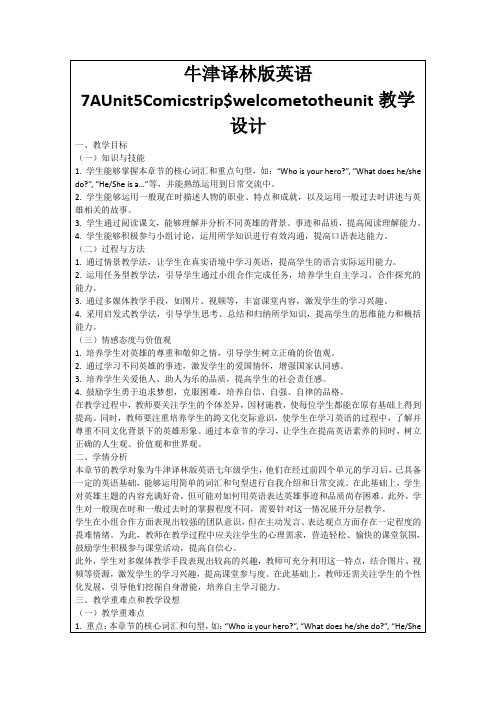
(4)小组讨论:引导学生就英雄话题展开讨论,提高学生的口语表达能力。
(5)总结反馈:教师对学生的表现进行点评,强调重点知识,解答学生的疑问。
3.针对不同学生的学习需求,实施分层教学:
(1)对基础薄弱的学生,重点辅导词汇和句型,提高他们的语言表达能力。
作业布置要求:
1.作业量适中,确保学生能够在规定时间内完成。
2.鼓励学生自主完成作业,培养自主学习能力。
3.家长协助监督,关注学生的学习进度,提高作业质量。
4.教师及时批改作业,给予反馈,指导学生改进学习方法。
(二)讲授新知
1.教师呈现课文Comic strip,引导学生关注英雄人物的形象和特点。
2.学生跟读课文,理解对话内容,学习核心词汇和句型,如:“Who is your hero?”, “What does he/she do?”, “He/She is a…”等。
3.教师讲解一般现在时和一般过去时的用法,结合课文中的例子,让学生在实际语境中感受两种时态的运用。
(一)导入新课
1.教师出示一张英雄人物的图片,如蜘蛛侠、雷锋等,引导学生观察并思考:“Who is your hero? Why do you think he/she is a hero?”
2.学生分享自己心中的英雄,教师引导学生用英语简要描述该英雄的特点和事迹。
3.教师总结学生的回答,引出本节课的主题:“Today, we are going to learn about heroes and what they do.”
4.学生模仿课文中的对话,进行角色扮演,巩固所学词汇和句型。
(三)学生小组讨论
译林牛津版英语模块八Unitwelcometotheunit教学课件

Common rules on writing a summary
1. Focus on main ideas and l_e_a_ve__o_u_t examples and details. •2. When using the words and phrases in the original passage, do not include your own opinion, but be sure to use your own words
Florence Chadwick
• 2.What did the woman attempt to do at age 34?
to become the first woman to swim from Catalina Island to the California coast.
• 3.Why did she fail in her first attempt but succeed in her second attempt ?
out the topic sentences ,key words and phrases.
2.Tense: use the tense based on the passage. 3.Rewrite: Write in our own words.
4.Join: In our final draft, insert transitional words
polish and perfect the writing.
The song reminds us that all of us should have confidence in ourselves, be ready to challenge ourselves, and have a good dream ,with which you can make everything possible.
牛津译林版英语9AUnit5ComicstripWelcometotheunit教学设计
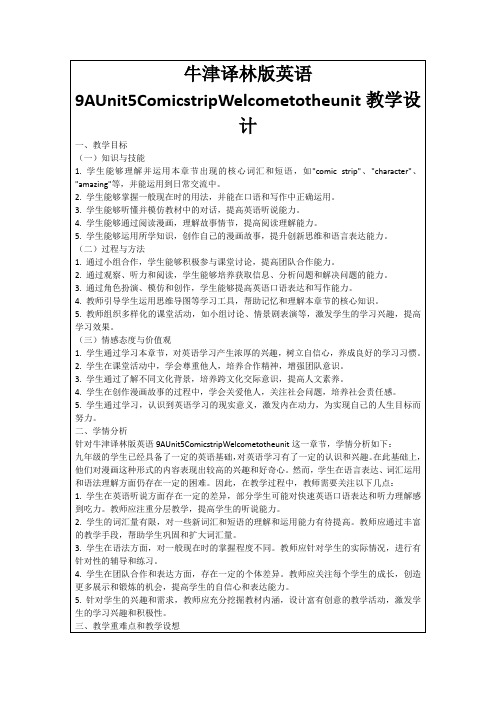
一、教学目标
(一)知识与技能
1.学生能够理解并运用本章节出现的核心词汇和短语,如"comic strip"、"character"、"amazing"等,并能运用到日常交流中。
2.学生能够掌握一般现在时的用法,并能在口语和写作中正确运用。
作业布置注意事项:
1.作业难度适中,确保每位学生都能完成。
2.作业量适中,避免给学生造成过重的负担。
3.鼓励学生主动思考,发挥创意,提高作业的趣味性。
4.教师在批改作业时,要及时给予反馈,指导学生改进学习方法。
5.作业完成后,组织课堂分享,让学生相互借鉴,提高学习效果。
针对牛津译林版英语9AUnit5ComicstripWelcometotheunit这一章节,学情分析如下:
九年级的学生已经具备了一定的英语基础,对英语学习有了一定的认识和兴趣。在此基础上,他们对漫画这种形式的内容表现出较高的兴趣和好奇心。然而,学生在语言表达、词汇运用和语法理解方面仍存在一定的困难。因此,在教学过程中,教师需要关注以下几点:
难点:如何在实际语境中灵活运用所学词汇和语法,进行准确的口语表达和写作。
2.重点:培养学生的阅读理解能力和听说能力。
难点:提高学生在快速英语口语交流中的反应速度和听力理解能力。
3.重点:激发学生的创新思维,创作漫画故事。
难点:如何引导学生将所学知识运用到创作中,实现语言知识的内化。
(二)教学设想
1.针对词汇和语法教学,采用以下方法:
(二)讲授新知
1.教师带领学生学习本节课的核心词汇和短语,如"amazing"、"frightened"、"scream"等,通过图片、实物等直观教具,帮助学生理解和记忆。
牛津译林版8AUnit1 welcome to the unit 教案
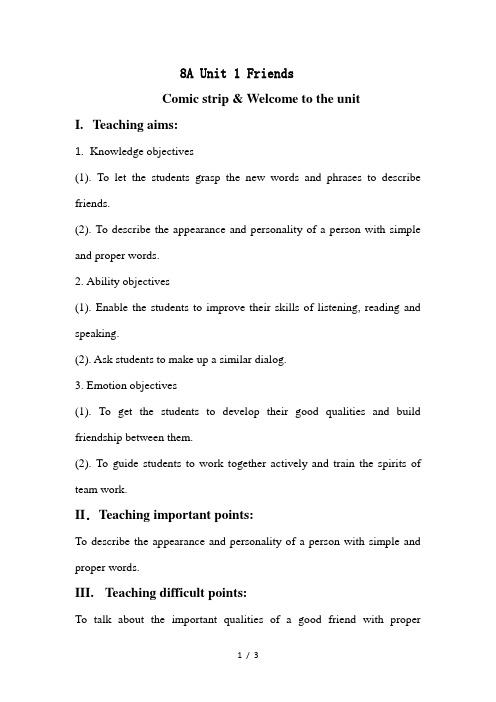
8A Unit 1 FriendsComic strip & Welcome to the unitI.Teaching aims:1.Knowledge objectives(1). To let the students grasp the new words and phrases to describe friends.(2). To describe the appearance and personality of a person with simple and proper words.2. Ability objectives(1). Enable the students to improve their skills of listening, reading and speaking.(2). Ask students to make up a similar dialog.3. Emotion objectives(1). To get the students to develop their good qualities and build friendship between them.(2). To guide students to work together actively and train the spirits of team work.II.Teaching important points:To describe the appearance and personality of a person with simple and proper words.III.Teaching difficult points:To talk about the important qualities of a good friend with properadjectives.IV.Teaching aids: PPTV.Teaching ProceduresStep 1 Lead-in1. Enjoy a song to lead in the topic of the unit―Friends2.Free talkAsk some open questions:eg. Do you have a good friend?What does your friend look like?What’s your friend good at?Why do you choose him/her as your good friend? /What makes your friend so special?Step2 Presentation1. Show pictures of Hobo and EddieT: It’s nice to see Hobo and Eddie again. Do you like them?Yes, they are funny and they can always make us happy2. Listen and answerLet’s listen and answer the questions:(1)How does Hobo feel?(2)What does Eddie give Hobo? (A cake, some milk)(3)What else does Hobo want? (The pizza in Eddie’s bowl)3. Fill in the blanks according to the dialog.4. Have a discussion.(1)Will they share the pizza? Why or why not?(Yes, they will. Because good friends always share things with each other. /No, they won’t. Because Hobo already has a big cake.)(2)Do you think they are good friends?Step 3 Practice1. Listen to the conversation again and pay attention to your pronunciation and intonation. (Good students can add an ending to it.)2. Practice in pairs and try to act it out. Choose some pairs to act it out. Step4 Presentation1.Present some new words.2. Finish Part A on P7Daniel is reading about a writing competition in Teenagers magazine. Let’s help him match the qualities on the left with the questions on the right. Then ask students to memorize some important phrases.3.Listen and fill in the form:Daniel and Amy are talking about what qualities are important in good friends. Listen and fill in the form :What do they think good friends should be like?Step5 Practice1. Listen to the conversation again carefully and pay attention to your pronunciation and intonation2.Read in roles. Boys act Daniel, girls act Amy, then exchange.3. Make up a similar dialogue.Walk around and give students some help. Practice in pairs4. Play a guessing game.Now let’s pl ay a guessing game. One of you will describe your good friend in our class with 4/5 sentences and the others will guess who he/she is.Step 6 ExercisesStep7 SummarizeT: Today we have learned some important qualities about a good friend. It seems that we all think appearance is not so important, but a friend should be helpful and honest. And I hope everyone can be like that and you will have more friendsStep8 Homework1. Remember the words and language points in this lesson.2. Describe a good friend of yours with the words and phrases learnt in this lesson.3. Finish the exercise paper.。
牛津版高中英语Module 5 Unit 2 Welcome to the unit教学设计
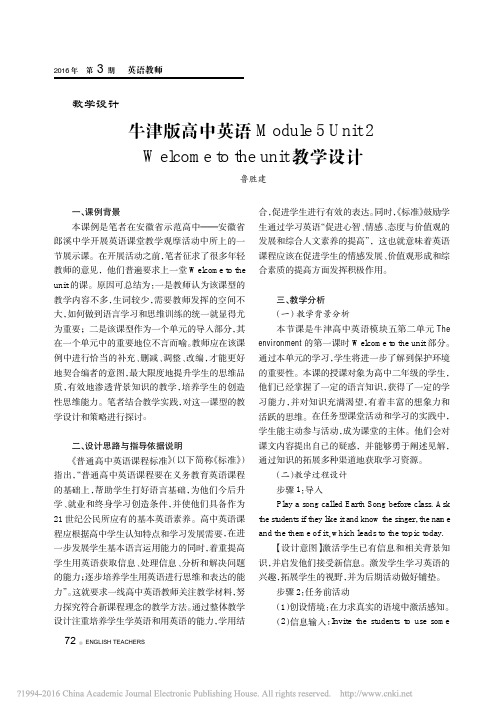
2016年第3期英语教师一、课例背景本课例是笔者在安徽省示范高中———安徽省郎溪中学开展英语课堂教学观摩活动中所上的一节展示课。
在开展活动之前,笔者征求了很多年轻教师的意见,他们普遍要求上一堂Welcome to the unit的课。
原因可总结为:一是教师认为该课型的教学内容不多,生词较少,需要教师发挥的空间不大,如何做到语言学习和思维训练的统一就显得尤为重要;二是该课型作为一个单元的导入部分,其在一个单元中的重要地位不言而喻。
教师应在该课例中进行恰当的补充、删减、调整、改编,才能更好地契合编者的意图,最大限度地提升学生的思维品质,有效地渗透背景知识的教学,培养学生的创造性思维能力。
笔者结合教学实践,对这一课型的教学设计和策略进行探讨。
二、设计思路与指导依据说明《普通高中英语课程标准》(以下简称《标准》)指出,“普通高中英语课程要在义务教育英语课程的基础上,帮助学生打好语言基础,为他们今后升学、就业和终身学习创造条件,并使他们具备作为21世纪公民所应有的基本英语素养。
高中英语课程应根据高中学生认知特点和学习发展需要,在进一步发展学生基本语言运用能力的同时,着重提高学生用英语获取信息、处理信息、分析和解决问题的能力;逐步培养学生用英语进行思维和表达的能力”。
这就要求一线高中英语教师关注教学材料,努力探究符合新课程理念的教学方法。
通过整体教学设计注重培养学生学英语和用英语的能力,学用结合,促进学生进行有效的表达。
同时,《标准》鼓励学生通过学习英语“促进心智、情感、态度与价值观的发展和综合人文素养的提高”,这也就意味着英语课程应该在促进学生的情感发展、价值观形成和综合素质的提高方面发挥积极作用。
三、教学分析(一)教学背景分析本节课是牛津高中英语模块五第二单元The environment的第一课时Welcome to the unit部分。
通过本单元的学习,学生将进一步了解到保护环境的重要性。
本课的授课对象为高中二年级的学生,他们已经掌握了一定的语言知识,获得了一定的学习能力,并对知识充满渴望,有着丰富的想象力和活跃的思维。
牛津译林版八年级英语下册Unit8comicandwelcometotheunit说课稿
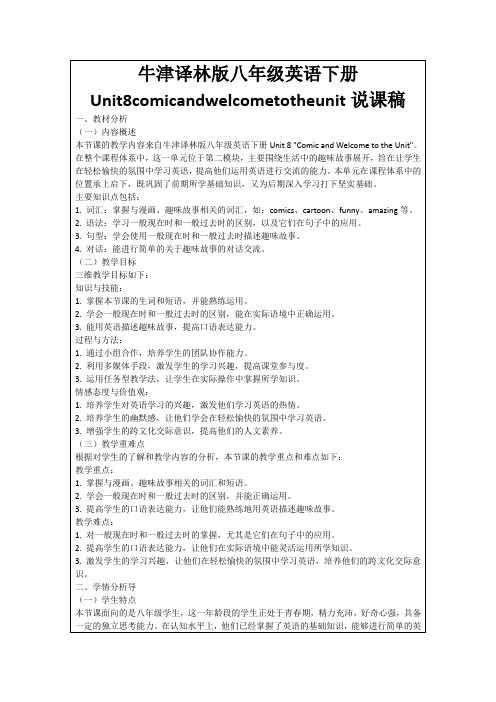
三、教学方法与手段
(一)教学策略
我将采用任务型教学法作为主要教学方法。任务型教学法以学生为中心,注重学生在实际语境中运用所学知识解决问题,培养学生的语言实际运用能力。这一方法的理论依据是交际法教学理论,认为语言学习的目的是为了交际,通过完成具体的任务来促进学生的语言习得。
(二)学习障碍
学生在学习本节课之前,已经掌握了英语的基本语法、词汇和句型。然而,他们可能在学习过程中遇到以下障碍:
1.对一般现在时和一般过去时的区别理解不够深入,容易混淆。
2.口语表达能力有限,用英语描述趣味故事时可能出现表达不清的情况。
3.部分学生对学习英语缺乏信心,课堂参与度不高。
(三)学习动机
2.学生在口语练习时可能存在害羞、不敢开口的现象。
3.课堂时间有限,可能无法让所有学生都有充分的机会参与互动。
为应对这些问题,我将:
1.通过小组活动和个别辅导,帮助学生巩固语法知识。
2.创设轻松的课堂氛围,鼓励学生大胆开口,增强自信心。
3.合理安排课堂时间,确保每个学生都能参与到课堂活动中。
课后,我将通过以下方式评估教学效果:
2.角色扮演:让学生扮演故事中的角色,进行情景对话,提高他们的口语表达能力。
3.课堂提问:教师提问,学生回答,鼓励学生积极参与课堂讨论,锻炼他们的思维能力和口语表达能力。
4.小组竞赛:设置小组竞赛,激发学生的竞争意识和团队合作精神。
四、教学过程设计
(一)导入新课
为了快速吸引学生的注意力和兴趣,我将采用以下方式导入新课:
三维教学目标如下:
知识与技能:
1.掌握本节课的生词和短语,并能熟练运用。
2.学会一般现在时和一般过去时的区别,能在实际语境中正确运用。
牛津译林版8B Unit5 Good manners Welcome to the unit课件(共11张PPT)
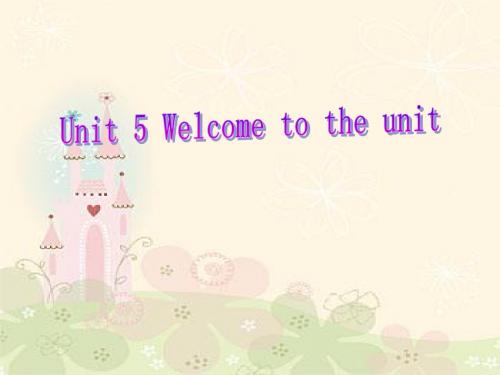
We should keep quiet keep the library clean put the books back after reading
We shouldn’t
chat drop litter everywhere eat write in the books
4) Sorry to leave my homework at home. 5) Mr Johnson left a note for you. 6)Don't leave it all until the last minute. 不要把什么事都留到最后一刻做。
7)When will he leave Germany for Paris? 5) Don’t leave the room until you clean it up.
We should obey We mustn't pick We should keep traffic rules. flowers in the park quiet in the librar It’s good manners to… It’s bad manners to…
We mustn't drop We should queue We mustn't leave litter everywhere. for our turn. the tap running.
1.我们的儿子已经够大,可以自己照顾自己了。 2. 他已经到了自己谋生的年龄了。 3. Eddie不够高去够到冰箱上的食物。 4. 我还不够自信在这么多人面前做演讲。 5. Tom不够强壮,来举起这个箱子。
1.Our son is old enough to look after himself. 2. He is old enough to make a living by himself. 3. Eddie is not tall enough to reach the food on the fridge. 4. I am not confident enough to give a talk in front of so many people. 5. Tom is not strong enough to lift the box.
Welcome to the unit--Grammar知识点汇总-牛津译林版八年级英语下册
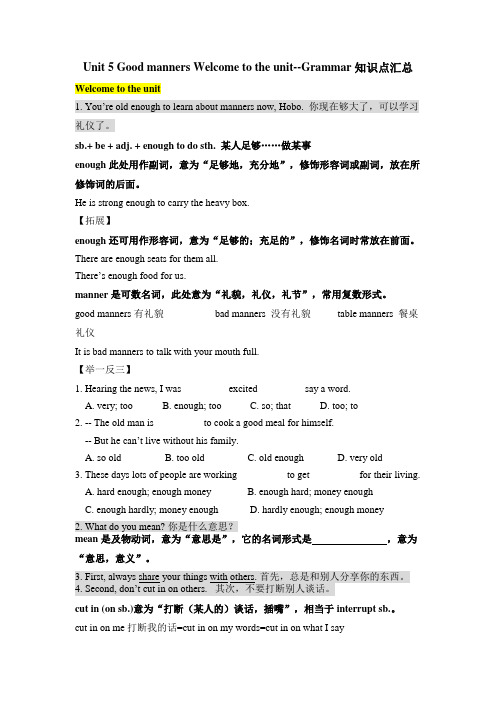
Unit 5 Good manners Welcome to the unit--Grammar知识点汇总Welcome to the unit1. You’re old enough to learn about manners now, Hobo. 你现在够大了,可以学习礼仪了。
sb.+ be + adj. + enough to do sth. 某人足够……做某事enough此处用作副词,意为“足够地,充分地”,修饰形容词或副词,放在所修饰词的后面。
He is strong enough to carry the heavy box.【拓展】enough还可用作形容词,意为“足够的;充足的”,修饰名词时常放在前面。
There are enough seats for them all.There’s enough food for us.manner是可数名词,此处意为“礼貌,礼仪,礼节”,常用复数形式。
good manners有礼貌bad manners 没有礼貌table manners 餐桌礼仪It is bad manners to talk with your mouth full.【举一反三】1. Hearing the news, I was _________excited _________say a word.A. very; tooB. enough; tooC. so; thatD. too; to2. -- The old man is _________ to cook a good meal for himself.-- But he can’t live without his family.A. so oldB. too oldC. old enoughD. very old3. These days lots of people are working _________ to get _________ for their living.A. hard enough; enough moneyB. enough hard; money enoughC. enough hardly; money enoughD. hardly enough; enough money2. What do you mean? 你是什么意思?mean是及物动词,意为“意思是”,它的名词形式是,意为“意思,意义”。
牛津译林版八年级下Unit5 Good manners学案
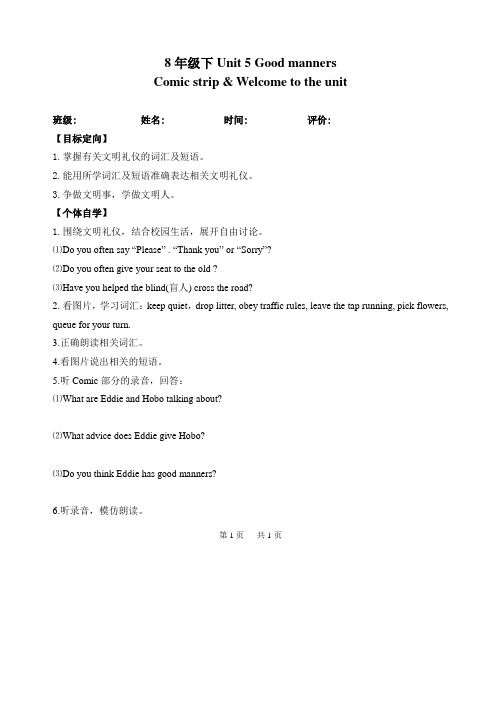
8年级下Unit 5 Good mannersComic strip & Welcome to the unit班级:姓名: 时间:评价:【目标定向】1.掌握有关文明礼仪的词汇及短语。
2.能用所学词汇及短语准确表达相关文明礼仪。
3.争做文明事,学做文明人。
【个体自学】1.围绕文明礼仪,结合校园生活,展开自由讨论。
⑴Do you often say “Please” . “Thank you” or “Sorry”?⑵Do you often give your seat to the old ?⑶Have you helped the blind(盲人) cross the road?2.看图片,学习词汇:keep quiet,drop litter, obey traffic rules, leave the tap running, pick flowers, queue for your turn.3.正确朗读相关词汇。
4.看图片说出相关的短语。
5.听Comic部分的录音,回答:⑴What are Eddie and Hobo talking about?⑵What advice does Eddie give Hobo?⑶Do you think Eddie has good manners?6.听录音,模仿朗读。
第1页共1页7.分角色,有表情的朗读对话。
8.小组表演对话。
9.根据对话内容,填写下列语句。
Eddie and Hobo are talking about . He thinks Hobo isto learn about manners. He thinks Hobo should his things others. He shouldn’t others when talking. He should learn to wait . But Hobo thinks Eddie should learn about manners too because anyone is never too old to learn. 【同伴互导】1.Work in groups.组内讨论What should or shouldn’t we do in the library?2.Read in pairs.分角色朗读Part B on P65 对话。
- 1、下载文档前请自行甄别文档内容的完整性,平台不提供额外的编辑、内容补充、找答案等附加服务。
- 2、"仅部分预览"的文档,不可在线预览部分如存在完整性等问题,可反馈申请退款(可完整预览的文档不适用该条件!)。
- 3、如文档侵犯您的权益,请联系客服反馈,我们会尽快为您处理(人工客服工作时间:9:00-18:30)。
Watch the video and answer questions.
1. What does Eddie teach Hobo?
First, share your things with others. Second, don’t cut in on others. Always wait politely.
Unit 5 Good manners
Welcome to the Unit
Do you have good manners?
Smile
Doing the right things in the public places.
We can’t drop litter everywhere! We should drop litter into the rubbish bin!
• Find out your bad manners and know how to get rid of(改正) them.
Doing the right things in the public places. Can you cross the road like this way?
We should Obey traffic rules.
Can we jump the queue like this way? jump the queue queue for our that he is old _e_n_o_u_gh to learn about manners. Hobo doesn’t _u_n_d_e_r_s_ta_n__d_what Eddie means. Eddie starts to _te_a_c_h_ hobo some good manners. First, Eddie asks Hobo to always s_h_a_r_e_ things with others. While saying so, he takes the _c_a_k_e_ from Hobo’s hand.
2. What does Eddie really want from Hobo?
He wants to eat Hobo’s cake.
• Eddie: You’re old enough to learn about manners, Hobo.
• Hobo: Eh? What do you mean? • Eddie: First, always share your things with
leave the taps running Save water
Good manners in the library
1. What should you do in the library? We should keep quiet, keep the library clean and put books back after reading. 2.What should you not do in the library? We shouldn’t drop litter everywhere. We can’t chat and eat in the library.
Hobo is surprised, and he shouts, “Hey!
That’s my _c_ak_e__ !” But Eddie asks Hobo to always _w_a_it__ politely instead of c_u_t_ti_n_g in on others.
Hobo is very a_n_g_r_y_ . He thinks Eddie
Manners in different places. A: Can we …? B: No , we can’t. We should…. A: Can we…? B: Yes, …
……
At the cinema At the park
Write down more right things and wrong things in the video as possible as you can.
others. Second… • Hobo: Hey, that’s my cake! • Eddie: Second, don’t cut on others. Always
wait politely. • Hobo: You should learn about manners too.
You’re never too old to learn.
should learn about manners too.
Discussion
May day is coming. What should you do and should not do when you go travelling?
• Have a summary(总结)about good manners you have known.
